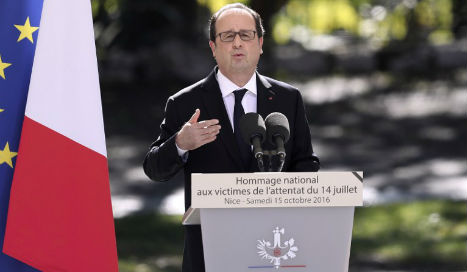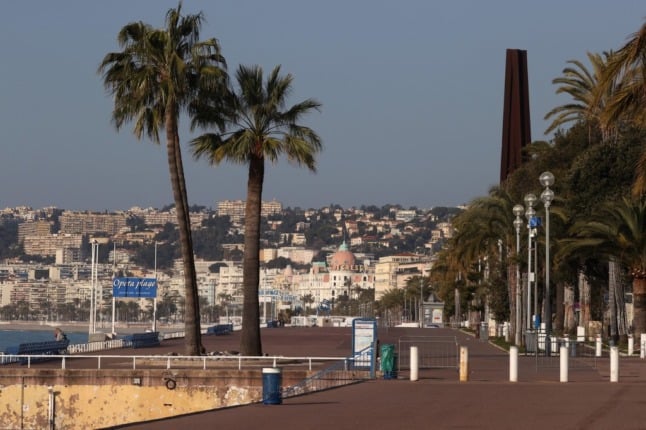Saturday's ceremonies in the Riviera resort city had been postponed until a day after the three-month anniversary because of storms in the region.
“What was attacked on July 14 was national unity,” Hollande told hundreds of victims' relatives and officials invited to the ceremony. “It is the monstrous aim of the terrorists, to attack some in order to terrify others, to unleash violence in order to sow division… Well, I tell you, no, this evil enterprise will fail,” he said.
“In some families, three generations were swept away,” Hollande said, as he described “the entire nation's compassion and solidarity” for mourning relatives.
The July 14 attack saw a 31-year-old Tunisian extremist ram a 19-tonne truck into a crowd of 30,000 holiday revellers on the Promenade des Anglais seafront before police shot him dead.
More than 400 people were injured, some grievously. The Islamic State (IS) group said the driver, Mohamed Lahouaiej Bouhlel, was one of its followers.
The massacre marked a peak of brutality in a string of jihadist attacks in France over the past two years that have ramped up security fears while stoking anti-immigrant sentiment ahead of presidential elections in 2017.
Hollande's Socialist government came under fire for alleged security lapses ahead of the attack in Nice, a bastion of the rightwing opposition. Several politicians from the right attended the ceremony including former president Nicolas Sarkozy and Alain Juppe, both candidates in the Republicans party's presidential primary next month, and far-right National Front (FN) leader Marine Le Pen. Many families are still struggling to deal with their grief.
“Nice and all of France weeps for the 86 victims. Our sadness is unending,” said Cindy Pellegrini, a relative of the victims, who read a text in their memory at the start of the one-hour ceremony.
And some survivors of the attack are still trying to put their lives back together. Vincent Delhommel Desmarest, who runs a restaurant on the Promenade des Anglais, is still haunted by the bloodbath and has yet to return to work.
“You don't sleep at night. I saw the whole thing, the lorry bearing down, the mutilated, decapitated bodies, the guts,” said Desmarest, leader of a victims' group.
Another witness told investigators he was nearby when the attacker Bouhlel started up the lorry.
“I saw the driver smile and accelerate,” he said. The rampage that followed lasted four minutes and 17 seconds up to Bouhlel's death.
The Islamic State group later said Bouhlel had been one of its “soldiers” inspired by IS propaganda to attack Western targets.
Nearly a third of those killed were Muslims and 15 of them were children and adolescents.
The recriminations following the Nice atrocity posed a fresh challenge for the already deeply unpopular Hollande, who has yet to announce whether he will run for re-election next year.
Critics pointed to an insufficient police presence in Nice despite the state of emergency in place since the November 13 attacks last year that claimed 130 lives in Paris.
Four days after the Nice attack, Prime Minister Manuel Valls was booed when he visited the city to honour the victims.
The attack also exacerbated tensions in French society, felt particularly by the country's three- to four-million-strong Muslim community — the largest in Europe. Several councils went on to forbid the wearing of burkini swimwear, before the controversial ban was reversed by France's highest court.
Hollande has tried to unite the country behind calls for a “France of fraternity” in the fight against extremism.
But solidarity remains elusive. A boar's head was found outside a mosque in Nice on Tuesday, the second such anti-Muslim incident this year.



 Please whitelist us to continue reading.
Please whitelist us to continue reading.